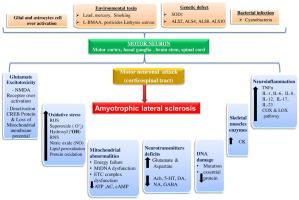European Journal of Cell Biology ( IF 6.6 ) Pub Date : 2021-09-17 , DOI: 10.1016/j.ejcb.2021.151179 Rakesh Sahu 1 , Shubham Upadhayay 1 , Sidharth Mehan 1

|
Cell signal transduction pathways are essential modulators of several physiological and pathological processes in the brain. During overactivation, these signaling processes may lead to disease progression. Abnormal protein kinase activation is associated with several biological dysfunctions that facilitate neurodegeneration under different biological conditions. As a result, these signaling pathways are essential in understanding brain disorders' development or progression. Recent research findings indicate the crucial role of extracellular signal-regulated kinase-1/2 (ERK-1/2) signaling during the neuronal development process. ERK-1/2 is a key component of its mitogen-activated protein kinase (MAPK) group, controlling certain neurological activities by regulating metabolic pathways, cell proliferation, differentiation, and apoptosis. ERK-1/2 also influences neuronal elastic properties, nerve growth, and neurological and cognitive processing during brain injuries. The primary goal of this review is to elucidate the activation of ERK1/2 signaling, which is involved in the development of several ALS-related neuropathological dysfunctions. ALS is a rare neurological disorder category that mainly affects the nerve cells responsible for regulating voluntary muscle activity. ALS is progressive, which means that the symptoms are getting worse over time, and there is no cure for ALS and no effective treatment to avoid or reverse. Genetic abnormalities, oligodendrocyte degradation, glial overactivation, and immune deregulation are associated with ALS progression. Furthermore, the current review also identifies ERK-1/2 signaling inhibitors that can promote neuroprotection and neurotrophic effects against the clinical-pathological presentation of ALS. As a result, in the future, the potential ERK-1/2 signaling inhibitors could be used in the treatment of ALS and related neurocomplications.
中文翻译:

抑制细胞外调节激酶 (ERK)-1/2 信号通路预防 ALS:靶标抑制剂及其对神经功能障碍的影响
细胞信号转导通路是大脑中几种生理和病理过程的重要调节剂。在过度激活期间,这些信号传导过程可能导致疾病进展。异常的蛋白激酶激活与几种生物功能障碍有关,这些功能障碍在不同的生物条件下促进神经退行性变。因此,这些信号通路对于了解脑部疾病的发展或进展至关重要。最近的研究结果表明细胞外信号调节激酶-1/2 (ERK-1/2) 信号在神经元发育过程中的关键作用。ERK-1/2 是其丝裂原活化蛋白激酶 (MAPK) 组的关键成分,通过调节代谢途径、细胞增殖、分化和凋亡来控制某些神经活动。ERK-1/2 还影响脑损伤期间的神经元弹性特性、神经生长以及神经和认知处理。本综述的主要目的是阐明 ERK1/2 信号的激活,该信号与几种 ALS 相关的神经病理功能障碍的发展有关。ALS 是一种罕见的神经系统疾病,主要影响负责调节随意肌活动的神经细胞。ALS是进行性的,这意味着随着时间的推移症状会越来越严重,并且没有治愈ALS的方法,也没有有效的治疗方法可以避免或逆转。遗传异常、少突胶质细胞降解、神经胶质过度激活和免疫失调与 ALS 进展有关。此外,目前的审查还确定了 ERK-1/2 信号抑制剂,可以促进针对 ALS 的临床病理表现的神经保护和神经营养作用。因此,未来,潜在的 ERK-1/2 信号抑制剂可用于治疗 ALS 和相关的神经并发症。



























 京公网安备 11010802027423号
京公网安备 11010802027423号